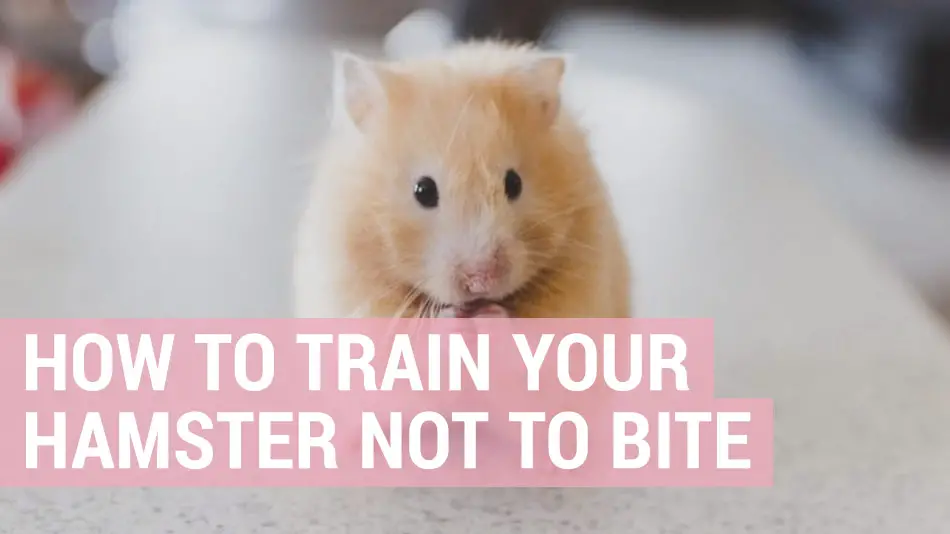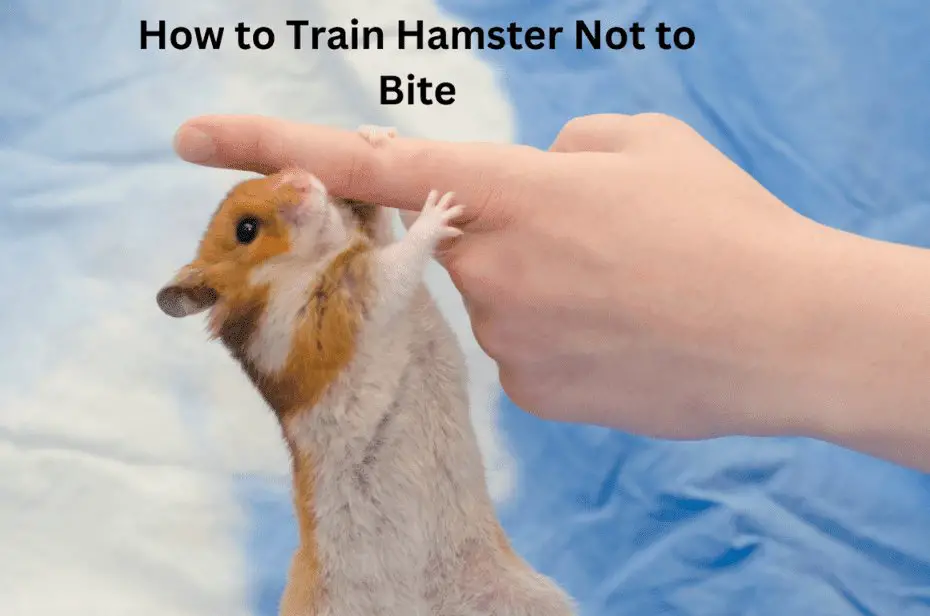Hamsters are one of the most popular pets in the world, and for good reason. They’re small, low-maintenance, and relatively easy to care for. However, one of the downsides to owning a hamster is that they have a tendency to bite.
While it’s not usually serious, it can be painful and even dangerous if you have a particularly aggressive hamster. So how do you train your hamster not to bite?
- Start by handling your hamster regularly so it gets used to being touched
- If your hamster does happen to bite, say “no” firmly and put it back in its cage
- Try offering your hamster a treat when you first put your hand in its cage
- This will help create a positive association with being handled
- Be patient and consistent with your training, and eventually your hamster should learn not to bite when being handled
How to STOP your hamster from biting
Can You Train a Hamster to Stop Biting?
Hamsters are notorious for their biting behavior. If you’ve ever had a hamster as a pet, you know that they can be quite nippy. But is there anything you can do to train your hamster to stop biting?
The answer is yes, you can train your hamster to stop biting. However, it will take some patience and consistency on your part. Here are a few tips to help you get started:
1. Handle your hamster regularly – Get in the habit of handling your hamster every day, even if it’s just for a few minutes at a time. This will help them get used to being handled and make them less likely to bite when they’re picked up.
2. Be gentle – When handling your hamster, be sure to do so gently and avoid any sudden movements that could startle them.
Sudden movements are more likely to result in a bite from your hamster.
3. Offer food rewards – Hamsters are motivated by food, so offer them small treats when they display good behavior (i.e., not biting). Over time, they’ll learn that behaving well results in getting a tasty treat!
4. Use positive reinforcement – Whenever your hamster refrains from biting, give them lots of praise and affection. This positive reinforcement will encourage them to keep up the good behavior.
How Do You Hold a Hamster Without Biting?
Assuming you would like tips on how to pick up and hold a hamster without getting bitten, here are a few things to keep in mind:
-Wash your hands before handling the hamster, so that they aren’t alarmed by your scent.
-Approach them slowly and calmly so as not to startle them.
-Offer them a treat to entice them into your hand.
-Cup your hand around their back end and support their weight as you lift them gently.
-Keep a firm grip but don’t squeeze too tightly, and bring them close to your body so they feel secure.
Is It Ok If a Hamster Bites You?
There are a few things to consider when answering this question. First, it depends on the severity of the bite. A hamster that bites hard enough to break skin is capable of causing an infection, so it’s important to clean any wounds thoroughly and seek medical attention if necessary.
However, a hamster that only nips without breaking skin is not as likely to cause an infection. Second, consider the reason why your hamster is biting you. If your hamster is acting out of fear or aggression, then it’s best to consult with a veterinarian or animal behaviorist to help you resolve the issue.
However, if your hamster is simply nibbling on you because they’re curious or want attention, then there’s no need for concern. Just be sure to provide your hamster with plenty of chew toys so they don’t start chewing on you out of boredom!

Credit: hamsterguru.com
My Hamster Bit Me And Drew Blood
My hamster bit me and drew blood. It wasn’t a big deal, but it did happen. Here’s what happened.
I was playing with my hamster in my hand and he suddenly bit me. I yelped and dropped him in surprise. He then scurried away and hid under my bed. I inspected the bite mark and saw that it was bleeding quite a bit.
I washed the wound with soap and water and applied some pressure to stop the bleeding. After a few minutes, the bleeding had stopped so I decided to leave it be. However, later that evening I noticed that the bite mark was starting to swell up and turn red.
I went to the doctor the next day just to be sure, and they confirmed that it was indeed an infection from my hamster’s bite. They prescribed me some antibiotics which cleared up the infection within a few days.
Since then, I’ve been more careful when handling my hamster and make sure to wash my hands after playing with him (or her).
If you have a pet hamster, just be aware that they can sometimes bite if they’re feeling scared or threatened – no matter how well you think you know them!
Hamster Bite Warning Signs
Hamsters are small, cute, and cuddly creatures that make popular pets. But did you know that hamsters can also bite? While a hamster bite is usually not serious, it can still be painful.
To avoid being bitten by your hamster, it’s important to be able to recognize the warning signs.
One of the most common warning signs of a impending hamster bite is if your pet starts to teeth grind. This is often a sign that your hamster is feeling stressed or threatened in some way.
If you see your hamster teeth grinding, try to remove whatever is causing the stress (such as loud noises or too much handling).
Another warning sign of a possible bite is if your hamster starts to lunge at you with its mouth open. This is usually a defensive move and means that your hamster feels scared or threatened.
Again, try to remove the source of the stress and give your pet some time to calm down.
If you see any of these warning signs, take caution when handling your hamster. Be gentle and avoid sudden movements that could startle or scare your pet.
If you must pick up your hamster, do so slowly and carefully using both hands to support its body weight. By taking these precautions, you can help prevent getting bitten by your furry friend!
Why Does My Hamster Bite Me When I Put My Hand in the Cage
If you’ve ever been nipped by your hamster, you’re probably wondering why they did it. Hamsters are small, cute creatures that are typically known for being gentle and docile. So, why would your hamster bite you when you put your hand in their cage?
There are a few reasons why your hamster might bite you when you reach into their cage. One possibility is that your hamster is feeling threatened or frightened. Remember, even though they’re small, hamsters are still wild animals at heart.
If they feel like they’re in danger, they may lash out and try to defend themselves.
Another reason why your hamster might bite you is if they’re trying to assert their dominance over you. This is especially common with males who are trying to establish themselves as the alpha in the relationship.
If your hamster bites you when you reach into their cage, it’s likely because they view you as a threat and want to show that they’re the one in charge.
Lastly, some hamsters simply don’t like being touched or handled. If this is the case with your furry friend, it’s best to just leave them be and let them come to you on their own terms.
Respect their personal space and don’t try to force them into interactions that make them uncomfortable.
If your hamster has bitten you once or twice, there’s no need to worry too much about it. Just be more mindful of how and when you approach them so that they don’t feel threatened or frightened.
In most cases, a little patience goes a long way with these delicate creatures!
Conclusion
You can train your hamster not to bite by following a few simple steps. First, make sure that you provide your hamster with plenty of chew toys so they have an outlet for their chewing instinct. Second, avoid handling your hamster too much as this can lead to them feeling threatened and biting in self-defense.
When you do handle them, be gentle and slow in your movements. Finally, if your hamster does happen to bite you, immediately give them a time out by placing them back in their cage for a few minutes. With consistency and patience, you will be able to train your hamster not to bite.
- From Babies To Adults: Navigating Hamster Development Milestones - April 14, 2024
- From Seeds To Treats: Unveiling The Secrets Of Hamster Diet And Behavior - April 14, 2024
- A Culinary Adventure: Discovering The Delightful Hamster Diet Variety - April 14, 2024


